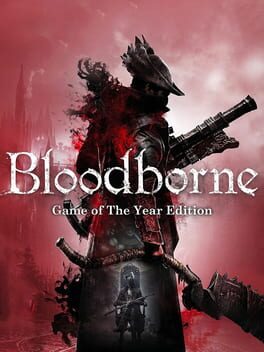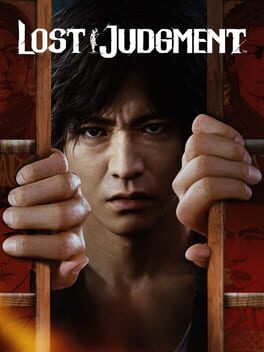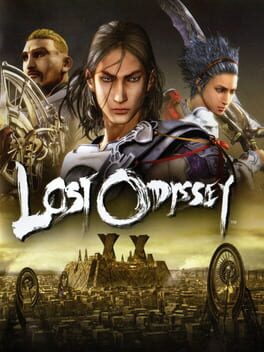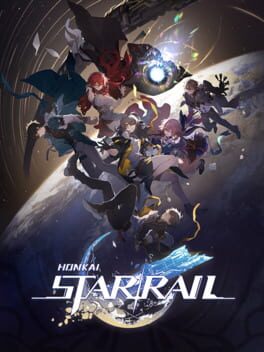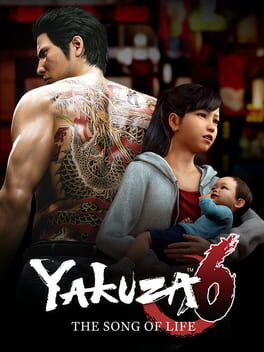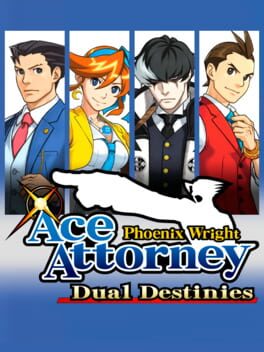CtheIronblooded
At this point in my life my time is too valuable to waste it playing games that I'm not having fun with. Gaming shouldn't be a chore, gaming shouldn't feel like a 2nd job. I should want to play your game because I actually enjoy it and have fun playing it. If I have to convince myself to even feel like playing your game, I'm just going to drop it all together.
However, I'm not a super picky person and do not consider myself a critic, I try to look for the best in everything so my ratings will still probably be higher than most people you'll see.
Been playing games since I was around 4 or 5. Fave game genres are RPGs of all kinds, but especially J-RPGs and Action RPGs, alongside metroidvanias, Hack and Slash/character action, horror and visual novels.
Feel free to follow me on Letterboxd and Rateyourmusic if you are interested in my film and music opinions as well.
Letterboxd: https://letterboxd.com/CtheIronblooded/
Rateyourmusic: https://rateyourmusic.com/~Dragonflame1994
Badges

GOTY '23
Participated in the 2023 Game of the Year Event

Pinged
Mentioned by another user

Famous
Gained 100+ followers

GOTY '22
Participated in the 2022 Game of the Year Event

Gone Gold
Received 5+ likes on a review while featured on the front page

Treasured
Gained 750+ total review likes

3 Years of Service
Being part of the Backloggd community for 3 years

Donor
Liked 50+ reviews / lists

Best Friends
Become mutual friends with at least 3 others

GOTY '21
Participated in the 2021 Game of the Year Event

Trend Setter
Gained 50+ followers

Well Written
Gained 10+ likes on a single review

Adored
Gained 300+ total review likes

Popular
Gained 15+ followers

Epic Gamer
Played 1000+ games

Elite Gamer
Played 500+ games

Gamer
Played 250+ games

Loved
Gained 100+ total review likes

Noticed
Gained 3+ followers

N00b
Played 100+ games

Liked
Gained 10+ total review likes
Favorite Games
1272
Total Games Played
013
Played in 2024
328
Games Backloggd
Recently Played See More
Recently Reviewed See More
Have you ever wondered what it would be like to play a Persona game with a cast of characters that are all middle-aged misfits and losers who are led by a 42 year-old homeless gamer with undiagnosed schizophrenia and the personality of Luffy from One Piece? Well boy do I have a game for you...
Featuring a whole new cast of characters, a new setting, a new protagonist and even a new battle system replacing the iconic beat-em up gameplay of old for turn-based J-RPG tactics, Like a Dragon truly feels like a fresh new beginning for the Yakuza series, but at the same time a natural evolution of the series formula as well because let's be honest, past Yakuza games were just J-RPGs with beat 'em up combat.
Like a Dragon follows the tale of Kasuga Ichiban, an ex-yakuza who hits rock bottom after a tragic betrayal. Homeless and struggling to survive, Ichiban goes on a personal quest to become the hero he always dreamt he could be and uncover the truth about his betrayal. Ichiban's story is a deep and personal adventure full of incredibly strong emotional moments and easily one of the best stories the Yakuza series has to offer in general.
I really appreciate how the early game does its best to make you feel powerless and homeless to the point of even finding 500 yen under a vending machine feels like a big event that should be celebrated and that gives such a massive sense of progression in the later game when you have millions of yen and the best gear possible. Also something I adore about Like a Dragon's story and something that sets it apart from other RPGs is how it makes even the most mundane things like just getting a job feel exciting and adventurous essentially turning real life itself into an adventure which is very fitting for a character like Ichiban.
Speaking of Ichiban a lot of people will be wondering how he stands up to Kiryu and all I can say is that after being the main protagonist of the series for 7 games Kazuma Kiryu leaves some big shoes to fill and Ichiban doesn't fill them, but that's ok because Kiryu and Ichiban are two completely different characters and the game itself does it's best to get this point across. Ichiban doesn't need to fill Kiryu's shoes or take up his legacy because Ichiban is Ichiban and here's what Ichiban is, a homeless 42 year-old delusional chuunibyou who thinks life is like a video game and has the personality of a teenage anime protagonist. He's hotheaded, overly optimistic to a fault, somewhat naive and would do anything for his friends but all these traits are exactly WHY he's so endearing and what makes him such an easy protagonist to root for, the world would be a better place if we were all a little bit more like Ichiban. Also Kazuhiro Nakaya's absolutely incredible voice acting performance really helps bring Ichiban to life as a character as well.
Yakuza games of the past primarily focused on Kiryu's life and his struggles and while Yakuza 7 does the same for Ichiban it's also an RPG with a full cast of characters that follow Ichiban from beginning to end and the game does everything in its power to flesh out Ichiban's fellow party members and companions just as well as him making the sense of camaraderie they all share feel that much more real and believable. Ichiban can build up bonds with his party members simply by teaming up with them on the battlefield or by spending downtime with them at the party's hideout the Survive Bar. Some of Ichiban's party members include a fellow homeless man, an ex-detective turned alcoholic driving instructor and a barmaid. Every party member has a Persona-like social link storyline called a "Drink Link" that you can experience. These in-depth stories help give tons of depth and flesh out Ichiban's party members a lot, but even doing smaller activities like walking around town or going to eat at a restaurant will trigger party conversations and interactions that remind me of the skits from the Tales Of series and even simple things like characters talking about their favorite foods or favorite movies together really give them tons of personality and make them feel more real and relatable.
Like I mentioned at the beginning of this review Like a Dragon is unlike any other Yakuza game before it being entirely turn-based and speaking as someone who has been playing J-RPGs for 20+ years of my life I think Like a Dragon has one of the most engaging and enjoyable turn-based combat systems I've ever experienced and one of the reasons why I say that is due to how dynamic the combat is thanks to the world around you constantly moving and your characters being able to use their surroundings as weapons in combat from picking up a bike they cross paths with as they go to attack an enemy to knocking an enemy into the road and letting traffic do the rest, there's no shortage of ways to handle combat situations. I also have to mention that the game is turn-based simply because that's the way Ichiban views the world when he gets into a fight due to his obsession with Dragon Quest and I think that's just another incredibly endearing aspect of his character and for a series known for its ludonarrative dissonance that's an incredibly clever way to explain the game mechanics and make them harmonize with the world of the game itself.
Naturally it's no surprise that Like a Dragon features an old school job system akin to classic Final Fantasy or Dragon Quest itself since that's Ichiban's favorite game, but what makes the job system of this game stand out is how over-the-top and silly it is. Most normal RPGs would have mages and warriors, but in Like a Dragon we get classes like "Homeless Guy" who can throw beans at enemies to summon pigeons to attack or Chef's who throw silverware or Host's who spray champagne among many other classes. The attack animations are just so over-the-top and silly that they give the game so much charm, but I think where this is most evident is in the Final Fantasy-like summons called "Poundmates" where Ichiban uses his cellphone to order some back up and the summons include a crawfish that can poison your enemies, a soup kitchen worker who can replenish your mana or a giant Yakuza dressed like a baby who's cry defeans your enemies among many others, getting a new summon was always a treat just to witness the wacky hijinks that would happen when activating it.
Yakuza games are known for their mini-games and side activities and Like a Dragon is no exception to this rule. Like a Dragon has series staples like karaoke (Featuring a few new songs which are great btw), Sega arcade games like Virtua Fighter, golf bingo and batting cages, but also new things like a Mario Kart styled racing game, a Pac-Man-like can collecting game and a massive business management simulator that is long enough and has enough depth to it that it could be its own standalone game. Another defining aspect of the Yakuza series has always been the sub-stories and like most games in the series Like a Dragon also features over 50 sub-stories (which act as the side-quests of the game) that help flesh out the world and its inhabitants even more and give extra depth to Ichiban as a character by going through these various stories and helping the people of the city around him.
Speaking of the world-building there's tons of references to past Yakuza games both in sub-stories and just in the main game too, plenty of returning characters as well and that's the one downside to the game because it's hard to recommend to people without them having played the past games as well, but that just comes with the territory of any long-running, interconnected series unfortunately.
From its Persona-like social links to it's Dragon Quest job system, Final Fantasy styled summons and Tales Of character interactions Like a Dragon is a J-RPG that's about J-RPGs. It's a beautiful love letter to my favorite genre of games wrapped up in an inspiring and emotional tale about a man who always chooses to look at the bright side of life no matter how dark things may seem. It has a charming and well written cast of memorable characters, deep and immersive world-building, tons of side content to get lost in for hours and one of the most fun, over-the-top and engaging turn based combat systems I've ever had the joy of experiencing. Simply put, Like a Dragon is nothing short of a genre defining and life changing masterpiece that will stick with me for the rest of my life and if you love J-RPGs as much as me you'd be a fool to miss out on this game.
Also both The Xianzhou Luofu storyline and the Penacony storyline were a LOT more interesting than the Belobog one because one felt more distinctly rooted in Chinese mythology and the other was this surreal dreamscape sci-fi murder mystery and they both were much more unique compared to the opening Belobog story which was a pretty standard sci-fi civil war story I've seen many times before (I still liked the actual characters though)
There's tons of new content and game modes to explore coming back almost a year later as well, I'd say they've improved the game a lot. I do still wish the combat wasn't so simple, but even with how simple it is, I've been addicted enough to spend another 60+ hours on this game since I picked it back up, so I guess that should say something. It also helps that HSR might be one of the most generous gachas that I've ever played giving F2P users the chance to earn thousands of Stellar Jade (The currency you use for the gacha pulls) so you could easily save up 100s of pulls even as a F2P user.
At the end of the day I'm glad I picked Star Rail back up and have been enjoying my time with it a lot and will probably continue to play it on and off because now I'm pretty invested in the world and characters and I look forward to seeing the continuing adventures of the Astral Express crew.
You play as a chosen one known as the Arisen, you've been marked by a great dragon and it has stolen your heart, now you're on a hunt to fell the beast and reclaim what was stolen from you. The actual story is pretty simplistic and barebones but where the game makes up for that is in the world-building and lore that is fascinatingly detailed and in-depth alongside some solid optional quests that help flesh out the side characters more.
A unique thing Dragon's Dogma is known for is the Pawn system. Pawns are other-worldly beings that only the Arisen can summon and command, Pawns are AI controlled, but function like player controlled avatars and act as your travel companions and party members. Players get to create both their Arisen player avatar and their main Pawn which other players can summon thanks to a shared in-game lobby. While Dragon's Dogma is a completely single-player game, the Pawn system gives a sense of camaraderie comparable to that of a legit co-op game in a way no other game does knowing that the Pawns you're summoning were create by other real people.
The crowning jewel of Dragon's Dogma has always been its combat and much like the first game, combat is what carries Dragon's Dogma II as well. There's 10 different Vocations which act as your various classes that range from a sword and shield user known as a fighter to an archer, a dagger wielding thief or a spell-slinging mage among others making for tons of variety to suit nearly every playstyle. The combat in Dragon's Dogma II is more streamlined thanks to making each vocation only able to utilize one type of weapon and only 4 skills at a time, (I lament the loss of my Mystic Knight vocation and magic classes having far less spells as well) but the game makes up for the lack of complexity with polish because combat feels more weighty and satisfying than ever before and since each vocation only has one weapon type (Other than the newly added Warefarer) that allows for them to feel more fleshed out with deeper move-sets.
Exploration is the other major focus of Dragon's Dogma and it does so in the least handholdy way possible akin to a Souls-like, so much so that I would say roughly 70% of the game is entirely missable from side quests to entire portions of the map especially if you were to just do the main story missions because the game incentivizes you to go out into its world, explore and create your own adventures. The level of freedom the game gives you even extends to quests making for a more authentic RPG experience allowing the player to complete most objectives in more than one way. Exploration itself was a double-edged sword for me because while it was one of my favorite things about the game because when it was good, it was GOOD and finding cool new areas like the Ancient Battleground, Misty Marshes, Mountain Shrine or Dragon's Breath Tower were some highlights of my playthrough but, it was also my least favorite seeing as how the map is 4X bigger than that of the OG Dragon's Dogma, but the amount of actual content in both is roughly the same and it certainly doesn't help that the map doesn't have enough variety and most of what you're going to be exploring is mountain sides and forests. Having such a massive map and limited fast travel just feels like unnecessary padding as far as I'm concerned and I would've preferred a smaller, more condensed map like the first game.
The actual locations and unique dungeons are spread so far and between that a huge part of the map is just empty space to be filled with tedious combat encounters and sometimes they just get too repetitive especially when most of what you're going to be fighting is just goblins and wolves. Even fighting massive creatures like the griffin or cyclops starts to lose its luster later in the game when you've fought them 50 times each, I just think the game could've done with more enemy variety to spice things up and it's disappointing neither the Hydra nor the Cocatrice made a comeback from the first game and special enemies like Medusa or the Sphinx can only be found in one location in the entire game.
I also want to make a special mention to the endgame/post-game content being very lackluster basically turning the game into a pseudo rogue-lite and doing the Majora's Mask 'If you don't compete this in so many days, the game ends' thing. There's only a couple optional bosses and there's not really anything new to explore either despite some new parts of the map opening up, it's just more empty space. The 'Unmoored World' is a cool concept and works well with the lore and narrative, but the execution leaves a lot to be desired and the fact once you finish the game you just immediately get thrown into NG+ kinda sucks too.
Despite it's lack of enemy variety, slightly empty world at times and rushed 3rd act, Dragon's Dogma II more than makes up for its flaws by being a game with a fun and polished combat system that has plenty of variety and depth to suit all kinds of playstyles, tons of small details to really immerse you into its world, a fantastic sense of freedom that let's you play however you want and a truly top notch sense of adventure and exploration at times. Dragon's Dogma II much like its predecessor is a very flawed game, but it's also a great one with tons of undeniable heart and soul behind it and is easily one of the best open-world RPGs in years right alongside Elden Ring and the Witcher 3.
